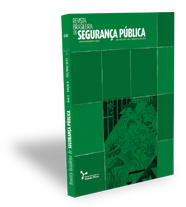O sistema Koban e a institucionalização do policiamento comunitário paulista
DOI:
https://doi.org/10.31060/rbsp.2011.v5.n1.83Keywords:
Policiamento Comunitário, Sistema Koban, PMESP, Japão, Liderança Institucional, Forças Isomórficas, Mudança OrganizacionalAbstract
Esse artigo trata das implicações e dimensões institucionais por detrás da adoção do sistema koban japonês pela Polícia Militardo Estado de São Paulo (PMESP). O autor observa a evolução dessa organização, de uma situação de vago entendimento paraa aplicação de práticas mais precisas de policiamento comunitário. Nesse contexto é que surge a decisão de procurar, adotare implementar um modelo estrangeiro de policiamento – o sistema koban japonês . Os líderes da PMESP estão preocupadoscom a evolução da polícia como um todo, incluindo suas aspirações e competências, como meio de legitimar a existência dainstituição. Por meio do koban, a liderança institucional da PMESP teve um papel fundamental no processo de implementação dopoliciamento comunitário. Por fim, a adoção da modalidade de koban certamente tem origens numa reconhecida necessidadede melhorar o desempenho institucional e a moral da PMESP; mas sua contribuição principal, mais que técnica, é a de auxiliarna construção deste novo organismo social integrado: o policiamento comunitário no Brasil.Downloads
References
BAYLEY, D. H., “The police and political development in England”, in C. Tilly (Ed.), The Formation of National States in Western Europe (pp. 328-379), Princeton, Princeton University Press, 1975.
BAYLEY, D. H., Police for the Future. New York, Oxford University Press, 1994.
BICUDO, H., “A unificação das polícias no Brasil”. Estudos Avançados, 14, 40: 91-106, 2000.
BOURDIEU, P., Outline of a Theory of Practice. Cambridge, Cambridge University Press, 1977.
CRANK, J. P., & LANGWORTHY, R., “An institutional perspective of policing”. The Journal of Criminal Law & Criminology, 83, 2: 338-363, 1992.
DALLARI, D. de A., “Organização policial integrada”. Revista Trimestral de Direito Público, 4:161-171, 1993.
ERICSON, R. V., & HAGGERTY, K. D., Policing the Risk Society. Toronto, University of Toronto Press, 1997.
FRÜHLING, H., “The impact of Community Policing and Police Reform in Latin America”, in J. Tulchin, & M. Ruthenburg (Eds.), Toward a Society under Law: Citizens and Their Police in Latin America. Washington DC, Woo-drow Wilson Center Press, 2006.
HUMAN RIGHT WATCH., Police Brutality In Urban Brazil. Retrieved June 29, 2010, 1997
KAHN, T., Policía comunitaria: Evaluando la experiencia. Santiago de Chile, Cento de Estudios para el Desarollo, 2003.
Klockars, C., “The rhetoric of community policing”, in J.Greene; & S. Mastrofski (Eds.), Community Policing: Rhetoric or Reality (pp. 239-258). New York, Praeger, 1988.
LIN, N., Social Capital: A Theory of Social Structure and Action. New York, Cambridge University Press, 2001.
MCKENZIE, I., & GALLAGHER, G. P., Behind the Uniform: Policing in Britain and America. New York, Harvester Wheatsheaf, 1989.
MARCH, J. G, & OLSEN, J. P., Ambiguity and Choice in Organizations. Bergen, Universitetsforlaget, 1976.
MEDEIROS, M. A., “Aspectos institucionais da unificação das polícias no Brasil”. DADOS – Revista de Ciências Sociais, 47, 2: 271-296, 2004.
MEYER, J. & ROWAN, B., Institutionalized organizations: Formal structure as myth and ceremony”, in W. W. Powell & P. J. DiMaggio (Eds.), The New Institutionalism in Organizational Analysis (pp. 41-62). Chicago, University of Chicago Press, 1991.
MILOFSKY, C. W., Structure and Process in Community Self Help Organizations. Working Paper No. 7, New Heaven, Yale Program on Non-Profit Organizations, 1981.
OECD. Responsive Government: Service Quality Initiatives. Paris: Head of Publications Service, OECD, 1996.
PARKER, L. C., The Japanese Police System Today: A Comparative Study. New York, An East Gate Book, 2001.
POWELL, W., & DIMAGGIO, P., “The iron cage revisited: institutional isomorphism and collective rationality in organizational fields”, in W. Powell and P. DiMaggio (Eds.), The New Institutionalism in Organizational Analysis(p. 63-81). Chicago, Chicago University Press, 1991.
PUTNAM, R. D., Making Democracy Work: Civic Traditions in Modern Italy. Robert Putnam with Robert Leonardi and Raffaela Nanetti. Princeton NJ, Princeton University Press, 1993.
SELZNICK, P., TVA and the grass roots: A Study in the Sociology of Formal Organization. Berkeley, University of California Press, 1953.
SELZNICK, P., Leadership in Administration: A Sociological Interpretation. Berkeley, University of California Press, 1957.
SCOTT, W. R., & MEYER, J. W. , “The organization of societal sectors”, in W. W. Powell and P. J. DiMaggio (Eds.), The New Institutionalism in Organizational Analysis (pp. 108-140). Chicago, University of Chicago Press, 1991.
SILVA, J. da, “Violência Policial e Ideologia dos Algozes Vítima”, in D. Oliveira et al., Violência Policial: Tolerância Zero? (pp. 69-84). Goiânia, Editora UFG, 2001.
SUCHMAN, M. C., “Managing legitimacy: Strategic and institutional approaches”. Academy of Management Review, 20: 571–611, 1995.
TOLBERT, P., & ZUCKER, L. , “The institutionalization of institutional theory”, in S. Clegg, C. Hardy & W. Nord (Eds.), Handbook of Organization Studies (pp. 175-190). London, Sage Publishers, 1996.
UCHIDA, S., Sofrimento Psíquico do Soldado da PM. São Paulo, Relatório de GVPesquisa, 2007.
WADDINGTON, P., “Community policing: A skeptical appraisal” in P. Norton (Ed.), Law and Order and British Politics (pp. 84-96). Aldershot, Gower, 1984.
Downloads
Published
How to Cite
Issue
Section
License
Copyright (c) 2012 Revista Brasileira de Segurança Pública

This work is licensed under a Creative Commons Attribution 4.0 International License.
Licensing
The Brazilian Journal of Public Security uses the Creative Commons License as a form of licensing for its published works. The license used follows the CC BY 4.0 - Attribution 4.0 International model.
To see the permitted rights please go to the full licence or to our Copyright and Licensing page.



